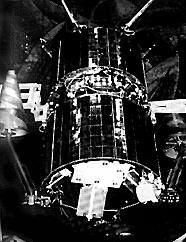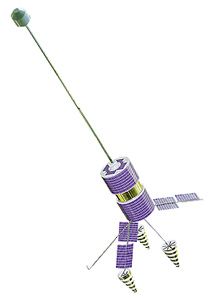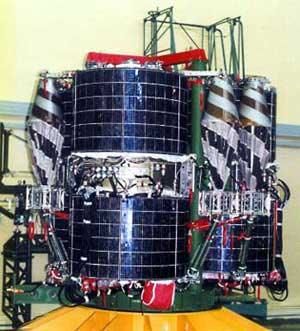Gonets-D1 (original) (raw)

Home - Search - Browse - Alphabetic Index: 0- 1- 2- 3- 4- 5- 6- 7- 8- 9
A- B- C- D- E- F- G- H- I- J- K- L- M- N- O- P- Q- R- S- T- U- V- W- X- Y- Z
Gonets-D1
Russian civilian store-dump communications satellite. Commercial version of GRU Strela-3 military store-dump satellite. Communication, Store-Dump satellite built by NPO Prikladnoi Mekhaniki (NPO PM) for RKA, Russia. Launched 2005 - 2015.
Status: Operational 1992. First Launch: 1992-07-13. Last Launch: 2005-12-21. Number: 15 . Gross mass: 233 kg (513 lb).
Gonets-D1 was to be deployed in a constellation of 12 satellites (2 planes of 6) between 1996 and 1998. Each satellite had a single simultaneous earth-space and space-earth channel. On-board storage was 12 Mbits of data, with a transmission rate of 2.4 kbit/sec. Two preproduction test spacecraft of slightly different configuration called 'Gonets-D' were flown. A partial D-1 constellation was completed and operated beyond the projected dates of termination. Funding was partially completed for the Mature Gonets system. The Integrated Sat/Com Corporation acquired preliminary licensing of the D-1 Program from Mexico.
In 1990 the principal spacecraft developers of the Strela-3 (the Applied Mechanics Scientific Production Association and the Precision Instruments Scientific Production Association) began to market a slightly modified version as a commercial communications relay. Through the SMOLSAT Consortium in Moscow, which also included the Soyuzmedinform Scientific Production Association and an American partner (COSSCASP, later known as Network Services International), the spacecraft were offered to support international health organizations to meet their global communications needs, e.g., the transfer of medical data and records to remote sites. In the commercial variant, the satellites, known as Gonets (Messenger), were capable of store-dump communications on 2-3 channels in the 2004-400 MHz band with a transmitter output power of 10 W. The 250-kg Gonets were to be deployed at 1,350 km at 82.5 degrees, similar to the Strela-3 satellites, but distributed among six orbital planes for a total constellation of 36 spacecraft. This infrastructure would ensure a mean communication waiting time of less than 20 minutes with more than 80% probability. Attitude control was achieved through gravity-gradient stabilization. The electrical power system, provided by solar cells and nickel-hydrogen batteries, provided an average 40 W for the payload which was designed to operate for five years.
Data transmission rates available include 2.4 kbits/s, 9.6 kbit/s, and 64 kbit/s with an onboard storage capacity of 8 Mbytes. A handheld user terminal (UT-P) resembles a cellular phone and weighs only 1-3 kg. Two demonstration Gonets (Gonets D) satellites were included in the Cosmos 2197-2202 mission (Cosmos 2199 and Cosmos 2201) and were tested successfully during 1992. Three additional Gonets D spacecraft were scheduled for launch in 1993, but did not appear.
More at: Gonets-D1.
Family: Civilian comsat store-dump, Communications, Medium earth orbit. Country: Russia. Launch Vehicles: R-14, Kosmos 3, Tsiklon, Kosmos 11K65M, Tsiklon-3. Projects: Strela. Launch Sites: Plesetsk, Plesetsk LC132/1, Plesetsk LC32/1, Plesetsk LC32. Agency: RAKA, Reshetnev bureau. Bibliography: 105, 2, 296, 4, 552, 554, 6.
Photo Gallery
 |
Gonets-1Commercial version of the Strela-3 military satellite.Credit: ESA |
|---|
 |
Cosmos 2384Credit: Manufacturer Image |
|---|
 |
Cosmos 2482Credit: Manufacturer Image |
|---|
1992 July 13 - . 17:41 GMT - . Launch Site: Plesetsk. Launch Complex: Plesetsk LC32. Launch Pad: LC32/1. LV Family: R-36. Launch Vehicle: Tsiklon-3.
- Cosmos 2199 - . Payload: Gonets-D no. 1. Mass: 220 kg (480 lb). Nation: Russia. Agency: MO. Program: Strela. Class: Communications. Type: Military store-dump communications satellite. Spacecraft Bus: Strela-3. Spacecraft: Gonets-D1. USAF Sat Cat: 22036 . COSPAR: 1992-042C. Apogee: 1,427 km (886 mi). Perigee: 1,412 km (877 mi). Inclination: 82.60 deg. Period: 114.20 min. Test flight of new Gonets commercial communication system. Investigation of outer space. .
- Cosmos 2201 - . Payload: Gonets-D no. 2. Mass: 220 kg (480 lb). Nation: Russia. Agency: MO. Program: Strela. Class: Communications. Type: Military store-dump communications satellite. Spacecraft Bus: Strela-3. Spacecraft: Gonets-D1. USAF Sat Cat: 22038 . COSPAR: 1992-042E. Apogee: 1,421 km (882 mi). Perigee: 1,412 km (877 mi). Inclination: 82.60 deg. Period: 114.10 min. Test flight of new Gonets commercial communication system. Investigation of outer space. .
1996 February 19 - . 00:58 GMT - . Launch Site: Plesetsk. LV Family: R-36. Launch Vehicle: Tsiklon-3.
- Cosmos 2328 - . Payload: Gonets-D1 No. 1. Mass: 250 kg (550 lb). Nation: Russia. Agency: RAKA. Program: Strela. Class: Communications. Type: Military store-dump communications satellite. Spacecraft Bus: Strela-3. Spacecraft: Gonets-D1. USAF Sat Cat: 23787 . COSPAR: 1996-009A. Apogee: 1,414 km (878 mi). Perigee: 1,399 km (869 mi). Inclination: 82.60 deg. Period: 113.90 min. LEO. Carried photo-surveillance system for disaster monitoring; also carried communications package .
- Cosmos 2329 - . Payload: Gonets-D1 No. 2. Mass: 250 kg (550 lb). Nation: Russia. Agency: RAKA. Program: Strela. Class: Communications. Type: Military store-dump communications satellite. Spacecraft Bus: Strela-3. Spacecraft: Gonets-D1. USAF Sat Cat: 23788 . COSPAR: 1996-009B. Apogee: 1,415 km (879 mi). Perigee: 1,406 km (873 mi). Inclination: 82.60 deg. Period: 114.00 min. LEO. Carried photo-surveillance system for disaster monitoring; also carried communications package .
- Cosmos 2330 - . Payload: Gonets-D1 No. 3. Mass: 250 kg (550 lb). Nation: Russia. Agency: RAKA. Program: Strela. Class: Communications. Type: Military store-dump communications satellite. Spacecraft Bus: Strela-3. Spacecraft: Gonets-D1. USAF Sat Cat: 23789 . COSPAR: 1996-009C. Apogee: 1,415 km (879 mi). Perigee: 1,410 km (870 mi). Inclination: 82.60 deg. Period: 114.10 min. LEO. Carried photo-surveillance system for disaster monitoring; also carried communications package .
1997 February 14 - . 03:47 GMT - . Launch Site: Plesetsk. LV Family: R-36. Launch Vehicle: Tsiklon-3.
- Gonets-D1 - . Payload: Gonets-D1 No. 4. Mass: 225 kg (496 lb). Nation: Russia. Agency: RAKA. Manufacturer: Reshetnev bureau. Program: Strela. Class: Communications. Type: Military store-dump communications satellite. Spacecraft Bus: Strela-3. Spacecraft: Gonets-D1. USAF Sat Cat: 24725 . COSPAR: 1997-006A. Apogee: 1,428 km (887 mi). Perigee: 1,413 km (877 mi). Inclination: 82.60 deg. Period: 114.20 min. Six satellites launched by a single carrier rocket..
- Gonets-D1 - . Payload: Gonets-D1 No. 5. Mass: 225 kg (496 lb). Nation: Russia. Agency: RAKA. Manufacturer: Reshetnev bureau. Program: Strela. Class: Communications. Type: Military store-dump communications satellite. Spacecraft Bus: Strela-3. Spacecraft: Gonets-D1. USAF Sat Cat: 24726 . COSPAR: 1997-006B. Apogee: 1,422 km (883 mi). Perigee: 1,413 km (877 mi). Inclination: 82.60 deg. Period: 114.20 min.
- Gonets-D1 - . Payload: Gonets-D1 No. 6. Mass: 225 kg (496 lb). Nation: Russia. Agency: RAKA. Manufacturer: Reshetnev bureau. Program: Strela. Class: Communications. Type: Military store-dump communications satellite. Spacecraft Bus: Strela-3. Spacecraft: Gonets-D1. USAF Sat Cat: 24727 . COSPAR: 1997-006C. Apogee: 1,414 km (878 mi). Perigee: 1,413 km (877 mi). Inclination: 82.60 deg. Period: 114.10 min.
2000 December 27 - . Launch Site: Plesetsk. Launch Complex: Plesetsk LC32/1. LV Family: R-36. Launch Vehicle: Tsiklon-3. FAILURE: The S5M third stage steering unit failed and the vehicle crashed a few thousand km downrange near Wrangel Island.. Failed Stage: 3.
- Gonets-D1 - . Mass: 225 kg (496 lb). Nation: Russia. Agency: RAKA. Manufacturer: Reshetnev bureau. Program: Strela. Class: Communications. Type: Civilian store-dump communications satellite. Spacecraft Bus: Strela-3. Spacecraft: Gonets-D1. Civilian communications. Failed to orbit..
- Gonets-D1 - . Mass: 225 kg (496 lb). Nation: Russia. Agency: RAKA. Manufacturer: Reshetnev bureau. Program: Strela. Class: Communications. Type: Civilian store-dump communications satellite. Spacecraft Bus: Strela-3. Spacecraft: Gonets-D1. Civilian communications. Failed to orbit..
- Gonets-D1 - . Mass: 225 kg (496 lb). Nation: Russia. Agency: RAKA. Manufacturer: Reshetnev bureau. Program: Strela. Class: Communications. Type: Civilian store-dump communications satellite. Spacecraft Bus: Strela-3. Spacecraft: Gonets-D1. Civilian communications. Failed to orbit..
2001 December 28 - . 03:24 GMT - . Launch Site: Plesetsk. Launch Complex: Plesetsk LC32/1. LV Family: R-36. Launch Vehicle: Tsiklon-3.
- Gonets D1 - . Mass: 225 kg (496 lb). Nation: Russia. Agency: VKS. Manufacturer: Reshetnev bureau. Program: Strela. Class: Communications. Type: Civilian store-dump communications satellite. Spacecraft Bus: Strela-3. Spacecraft: Gonets-D1. USAF Sat Cat: 27058 . COSPAR: 2001-058D. Apogee: 1,419 km (881 mi). Perigee: 1,411 km (876 mi). Inclination: 82.50 deg. Period: 114.10 min. Three military Strela-3 and three civilian equivalent Gonets-D1 satellites orbited in a single launch..
- Gonets D1 - . Mass: 225 kg (496 lb). Nation: Russia. Agency: VKS. Manufacturer: Reshetnev bureau. Program: Strela. Class: Communications. Type: Civilian store-dump communications satellite. Spacecraft Bus: Strela-3. Spacecraft: Gonets-D1. USAF Sat Cat: 27059 . COSPAR: 2001-058E. Apogee: 1,418 km (881 mi). Perigee: 1,416 km (879 mi). Inclination: 82.50 deg. Period: 114.20 min. Three military Strela-3 and three civilian equivalent Gonets-D1 satellites orbited in a single launch..
- Gonets D1 - . Mass: 225 kg (496 lb). Nation: Russia. Agency: VKS. Manufacturer: Reshetnev bureau. Program: Strela. Class: Communications. Type: Civilian store-dump communications satellite. Spacecraft Bus: Strela-3. Spacecraft: Gonets-D1. USAF Sat Cat: 27060 . COSPAR: 2001-058F. Apogee: 1,418 km (881 mi). Perigee: 1,404 km (872 mi). Inclination: 82.50 deg. Period: 114.00 min. Three military Strela-3 and three civilian equivalent Gonets-D1 satellites orbited in a single launch..
2005 December 21 - . 19:34 GMT - . Launch Site: Plesetsk. Launch Complex: Plesetsk LC132/1. LV Family: R-14. Launch Vehicle: Kosmos 11K65M.
- Gonets D1M 1 - . Mass: 225 kg (496 lb). Nation: Russia. Agency: VKS. Manufacturer: Reshetnev bureau. Program: Strela. Class: Communications. Type: Military store-dump communications satellite. Spacecraft Bus: Strela-3. Spacecraft: Gonets-D1. USAF Sat Cat: 28908 . COSPAR: 2005-048A. Apogee: 1,447 km (899 mi). Perigee: 1,437 km (892 mi). Inclination: 82.50 deg. Period: 114.70 min. Delayed from December 15. Civilian version of Strela-3 store-dump survivable military satellite..
Home - Search - Browse - Alphabetic Index: 0- 1- 2- 3- 4- 5- 6- 7- 8- 9
A- B- C- D- E- F- G- H- I- J- K- L- M- N- O- P- Q- R- S- T- U- V- W- X- Y- Z
© 1997-2019 Mark Wade - Contact
© / Conditions for Use
